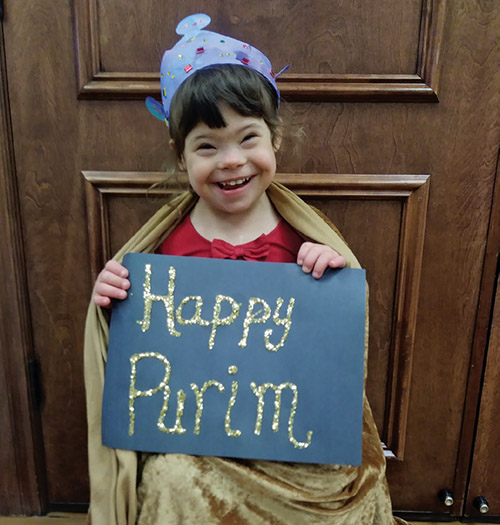
March 21 is World Down Syndrome Day. This year, it was also the 14 of Adar, Purim. In the tradition of taking lessons from our ancient holidays to enlighten our daily lives, I have been thinking about the story of Esther and how it relates to Down syndrome.
The first parallel is fairly straightforward: hidden identities. Purim seems to be all about hidden things. Even the name of the scroll we read from, Megillat Esther, has two meanings, the first being “the scroll of Esther,” and the second meaning “to expose the hidden.” God’s name does not appear in the story. And yet we know that the hand of God is active throughout the dramatic story. Esther hides some things, Haman hides some things but by the end of the story all is revealed.
I once read someone describe one of the challenges of Down syndrome (and really, it applies to any special need) as being stuck in a yellow slicker and hat all the time. A yellow slicker is so obvious. It can be big and bulky and uncomfortable. It hinders movement and gets in the way of doing simple tasks. It disguises its wearer so that you can’t identify one person wearing a slicker from another person in similar gear. But underneath the bright yellow plastic is a unique person who really just needs some help to be revealed, maybe help to do some simple tasks but they are still obviously worthy of respect and can accomplish many not-so-simple tasks. Perhaps it’s not a perfect metaphor, but certainly a Down syndrome diagnosis can hide a unique and beautiful individual and be a stumbling block to the rest of us who might have trouble separating the real person from the surface challenges.
Purim is also about fortunes shifting. The influential Haman is sentenced to death by the king on gallows of his own construction, while the humble Mordechai is elevated to a respected and trusted adviser, the king’s right-hand man. The date of Haman’s evil decree actually becomes a day of celebration that we have been celebrating for over 2,300 years. And Esther, an orphan in exile, becomes queen of all Persia and mother to emperors.
Similarly, a diagnosis of Down syndrome in a family can feel like a tragedy at first, of disappointed expectations, and limitations and obstacles. But the truth is that we feel more joy, more love, more pride and more acceptance than we ever could have imagined. We are watching a beautiful child grow without being able to compare her to anyone, and it is an awe-inspiring experience.
My favorite line of the Megilla has always been when Mordechai tells Esther “and who knows if it is not for just such a time that you reached this royal position.” It’s true; we seldom get to see the hand of God in our everyday lives, and we may never know exactly why we have been placed in a certain position at a specific time. For most people, we go through our lives making a never-ending series of tiny decisions. Sure, there are a few obvious big decisions, perhaps about education, jobs or moving and certainly the biggest decision is about being a family, but we never know the end of our story when making each of those decisions.
Consider all the twists and coincidences and random happenings that brought us to where we are today. Are they random? Purim reminds us that although we may think we are in charge of our lives, God plays an invisible yet ever-present role. There might be miracles that are obvious only to some people, while most people see just normal life. My husband, Rick, had one set of experiences, and I had a completely different set of experiences until we married seven years ago and became parents first to Stephen, and now Alexa, the gorgeous girl with the contagious smile you see in the photo. And who knows if it was not for just such a time that we started where we started and we became who we are.
Marbim b’simcha—increase joy! A perfect phrase for World Down Syndrome Day, right?
By Victoria Book Lupia
Victoria Book Lupia, the sister of JLNJ editor Elizabeth Kratz, is an art conservator who specializes in conserving rare art and heritage objects. She lives in Oklahoma City with her husband Rick, a paleontologist, and their two children, Stephen and Alexa.








